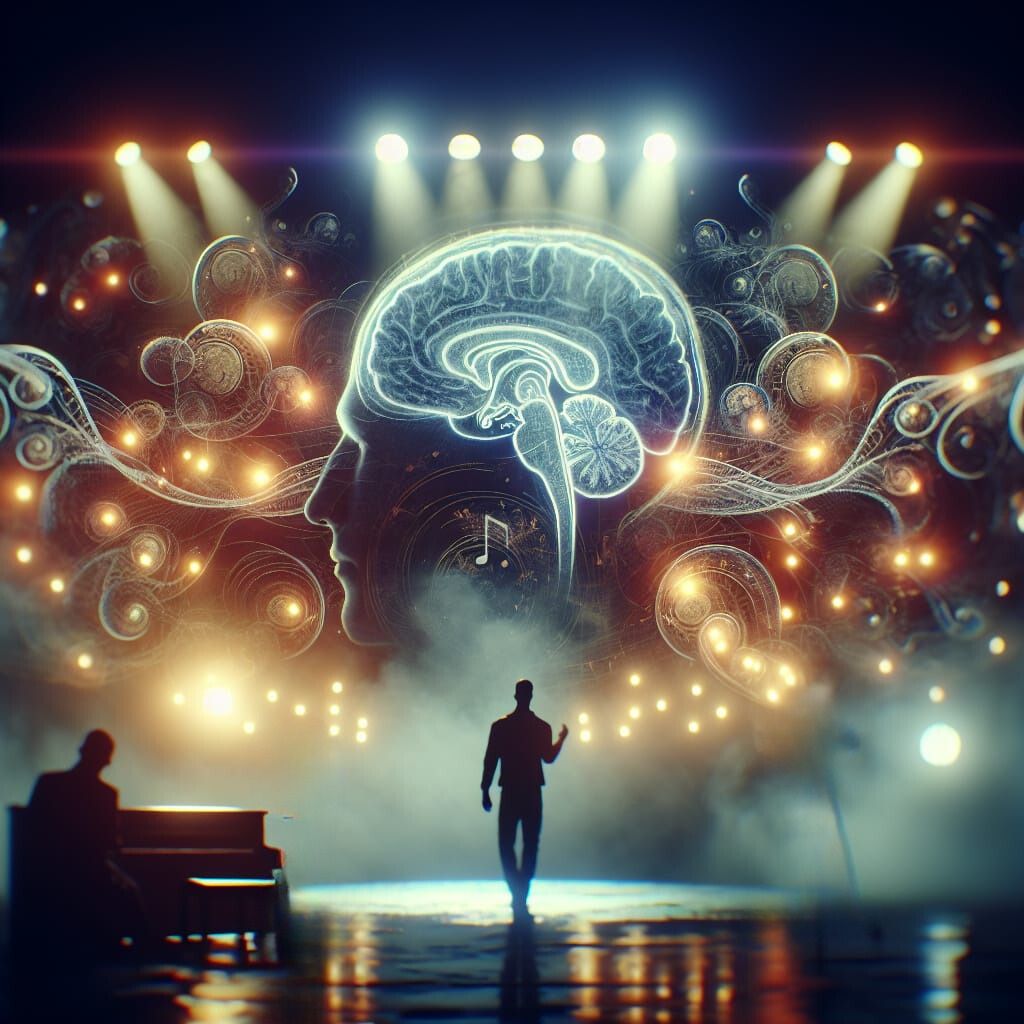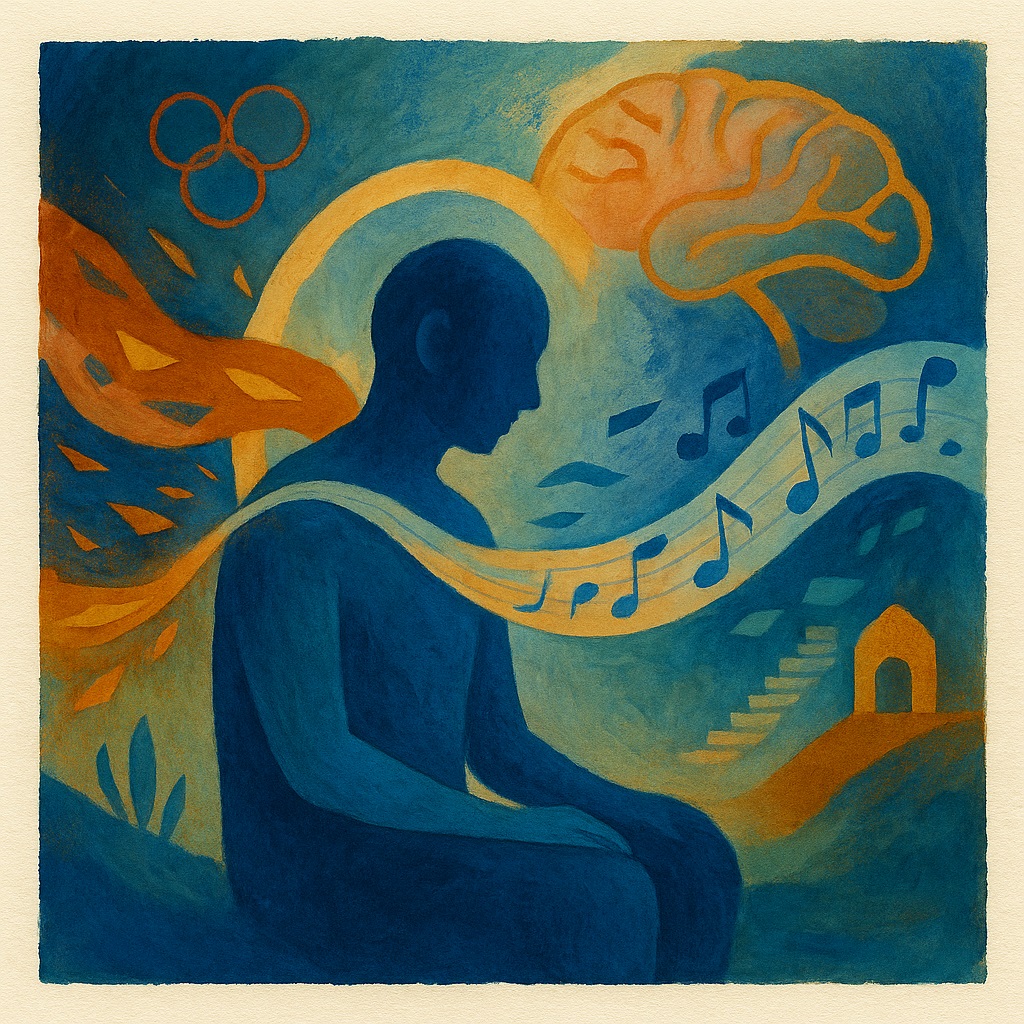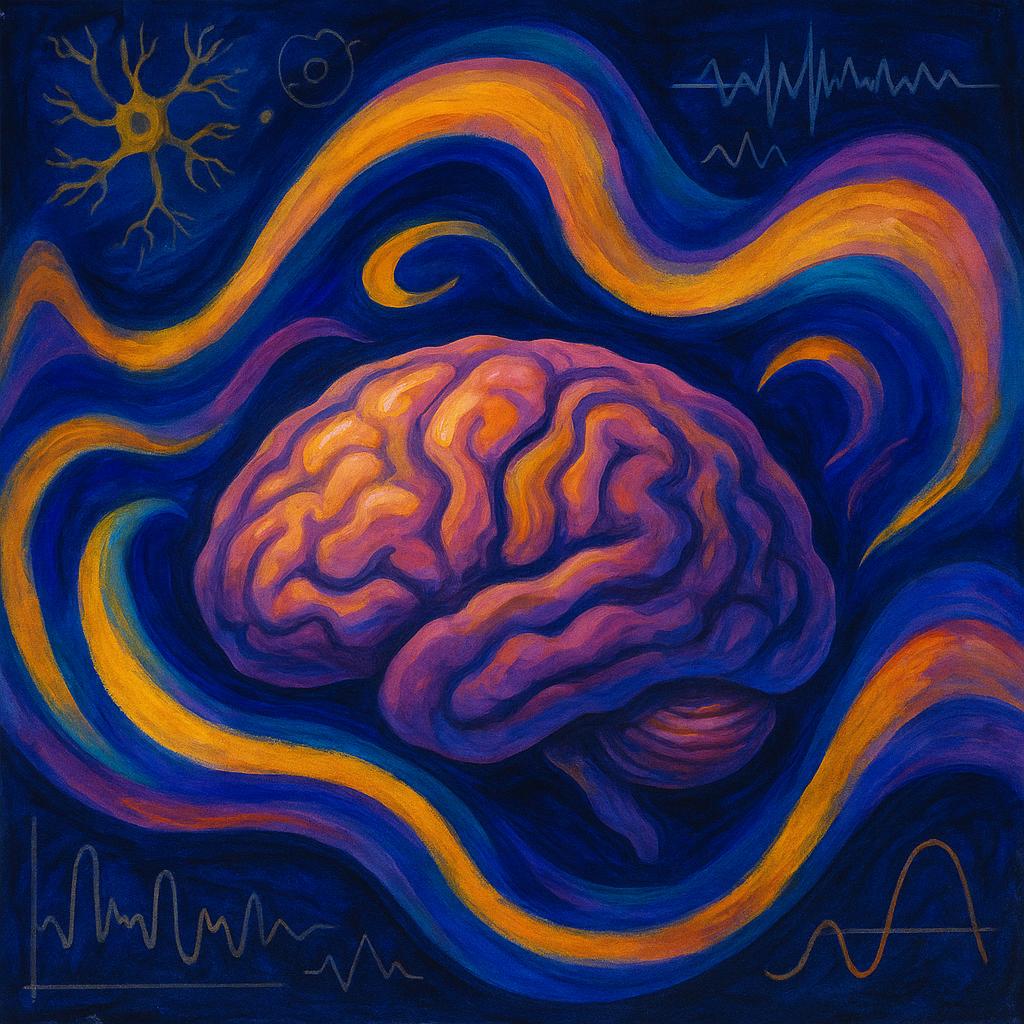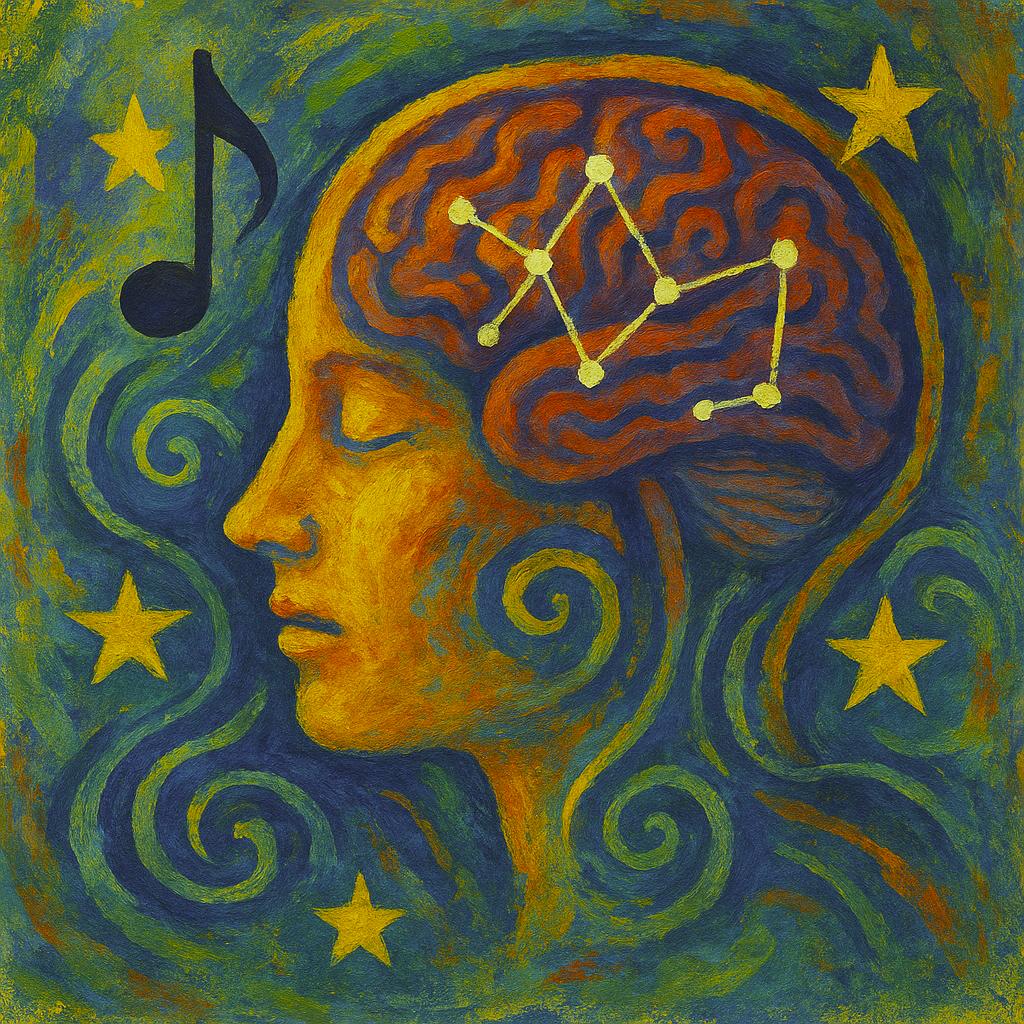Music is more than just a sequence of tones and rhythms; it is a fundamental aspect of human existence. It accompanies us from birth to old age, shapes our memories, influences our emotions, and offers comfort in difficult times. The impact of music is deeply rooted in human nature and extends beyond the cultural realm. With advancements in the scientific study of the human psyche and brain, the focus is shifting to how music affects our neurological and psychological processes.
My text explores the complex connections between music, the brain, and the psyche. It examines not only how music is processed neurologically but also its profound effects on our emotions, memory, and social interactions. With rapid progress in neuroscience, we can now better understand these processes and explore how musical experience shapes the brain and cognitive abilities. Additionally, the text discusses how music therapy can be used to alleviate mental health issues and improve quality of life.
By investigating these relationships, we can gain a deeper understanding of how music is embedded in our brain and psyche and how this knowledge can be applied to enhance human well-being. Music’s impact is universal and timeless, making it a crucial area of study in neurology, psychology, and beyond.
Music is a universal phenomenon present in all human cultures. Its deep connection to our brain and psyche is both fascinating and complex. To understand the links between music, neurology, and psychology, we must first examine the neurological processes involved in music processing. These processes are essential for explaining how music affects our brain and the psychological effects it can produce.
1. Neurological Foundations of Music Processing
When we listen to music, our brain performs a range of complex functions, from acoustic analysis to auditory memory, pattern recognition, and processing musical syntax and semantics. Music neuroscience provides a comprehensive understanding of these processes.
1.1 Acoustic Analysis
Acoustic analysis is the initial step in music processing. Physical sound reaching our ear is converted into electrical signals interpreted by the brain. This conversion occurs in the inner ear, where the hair cells in the cochlea transform sound into neural impulses, which are then transmitted via the auditory nerve to the auditory cortex.
In the auditory cortex, these acoustic signals are further processed. Basic acoustic properties such as pitch, volume, and timbre are analyzed. This phase of processing is largely unconscious and occurs very quickly. Within milliseconds, we can distinguish whether a sound is a musical note or something else.
1.2 Auditory Memory
Auditory memory is crucial for music processing. It allows us to recognize and remember sound patterns. Without this memory, recognizing or continuing melodies or rhythms would be impossible.
Auditory memory is divided into components. Sensory memory stores acoustic information briefly, usually for a few seconds, before it is either forgotten or transferred to working memory. Working memory allows us to analyze and understand musical structures, such as continuing a melody in our mind or tapping along with a song’s rhythm.
1.3 Auditory Pattern Formation
Auditory pattern formation is the process by which our brain combines individual sounds into coherent musical structures. This process is essential for perceiving music.
Gestalt psychologists have shown that our brain tends to recognize and organize patterns, including in music. When we hear a melody, our brain does not perceive the notes in isolation but combines them into a unified musical whole, enabling us to understand and enjoy complex musical structures.
1.4 Processing Musical Syntax
Processing musical syntax involves organizing musical structures in a way similar to language syntax. It refers to the rules and patterns governing the structure of music.
Studies have shown that our brain can recognize and apply these rules even without formal musical training. For example, we can intuitively sense when a chord in a sequence sounds “wrong,” even if we don’t know the exact harmonic rules involved.
1.5 Processing Musical Semantics
Musical semantics relates to the meaning we derive from music. Although music lacks direct linguistic meaning, it can evoke emotions, images, and thoughts.
Musical semantics involves various aspects. One is the semantic meaning generated by the music’s structure, such as tension created by an unexpected chord. Another aspect is the associations linked to cultural knowledge and personal experiences with specific music pieces, like how a song can evoke memories or emotions.
1.6 Neuroanatomical Foundations
The neuroanatomical foundations of music processing involve several brain regions, including the auditory cortex, prefrontal cortex, Broca’s area, hippocampus, and limbic system.
The auditory cortex processes sounds and patterns. The prefrontal cortex is involved in processing complex musical structures and syntax. Broca’s area, traditionally linked to language processing, also plays a role in musical syntax. The hippocampus is crucial for auditory memory, and the limbic system, including the amygdala, is heavily involved in the emotional processing of music.
This interaction among various brain regions shows how deeply music is integrated into our neurological processes. Music is not just an acoustic phenomenon but an integral part of our mental life.
2. Psychological Effects of Music
Music has profound and varied psychological effects. It can evoke emotions, trigger memories, influence behavior, and even cause physiological responses. The following describes some key psychological effects of music.
2.1 Emotional Reactions
Music can trigger strong emotional responses ranging from joy and excitement to sadness and melancholy. These reactions are largely universal, though individual differences in musical preferences and cultural backgrounds exist.
The emotional impact of music is determined by factors like structure, tempo, key, and instrumentation. For example, fast, rhythmic music can evoke excitement, while slow, minor-key music is often associated with sadness.
Neurological studies have shown that the limbic system, particularly the amygdala, plays a key role in processing the emotions elicited by music. The amygdala is involved in recognizing and processing emotional stimuli and reacts strongly to music with emotional significance.
2.2 Music and Memory
Music has a remarkable ability to evoke memories. People often experience strong emotional reactions to music linked to specific life events or times. This connection between music and memory is due to the close association between auditory and emotional memory in the brain.
The hippocampus, a brain region central to long-term memory, is heavily involved in these processes. Research indicates that music associated with strong emotional memories activates the hippocampus and other memory structures more intensely.
Music is also used in therapy for memory disorders. For patients with Alzheimer’s or other forms of dementia, music can help restore lost memories or stabilize emotional states.
2.3 Music and Learning
Music can affect learning and cognitive performance in various ways. Some studies suggest that listening to music while learning can enhance memory performance, especially for tasks requiring creativity or spatial abilities.
This effect is sometimes referred to as the “Mozart Effect,” though its exact mechanisms and general applicability are debated. Music is believed to support learning by increasing emotional engagement and focus.
Music therapy is also used to support children with learning difficulties or developmental disorders. It can help improve concentration, memory, and motor skills.
2.4 Music and Social Behavior
Music plays a role in social interactions by strengthening community feeling, fostering social bonds, and influencing group behavior. This is especially relevant in cultural and ritual contexts where music is central.
In psychology, the effects of music on social behavior are studied. For instance, group music-making or singing can enhance social cohesion and a sense of belonging. Music can also serve as a means of communication, especially in cultures where it has strong symbolic significance.
2.5 Music Therapy
Music therapy uses music as a therapeutic tool to treat various mental and physical conditions. It is based on the idea that music can profoundly affect emotions, behavior, and physiology.
Music therapy aims to promote emotional expression, reduce stress, support social interactions, and improve cognitive functions. It is used in contexts ranging from treating anxiety and depression to stroke rehabilitation.
Numerous scientific studies support the efficacy of music therapy, particularly for anxiety and stress disorders, pain relief, and emotional processing.
3. Musical Expertise and Its Effects on the Brain
Musical expertise, including learning and mastering an instrument or understanding music theory, has significant effects on brain structure and function. These changes illustrate brain plasticity, the ability of the brain to adapt through learning and experience.
3.1 Structural Changes in the Brain
Studies show that learning an instrument leads to measurable changes in brain structure. For instance, musicians have increased gray matter density in areas such as the auditory cortex, prefrontal cortex, and motor regions.
These changes result from the intensive and repetitive use of certain neural networks activated during music practice. Brain plasticity allows these networks to become more efficient and specialized over time.
3.2 Functional Changes
Musical expertise also leads to functional changes in the brain. Musicians often exhibit greater connectivity between brain regions involved in music processing, leading to more efficient processing of musical information and a better ability to analyze and understand complex musical structures.
Musicians also show enhanced synchronization of brain activity when listening to or playing music, reflecting the close connection between sensory, motor, and cognitive processes involved in music.
3.3 Effects on Other Cognitive Abilities
Musical expertise affects not only music processing but also other cognitive abilities. Studies have shown that musicians often have superior skills in memory, language processing, and spatial thinking.
These effects likely result from the transfer of skills developed through music practice. Playing an instrument requires concentration, precise motor control, and the ability to recognize and remember complex patterns, which can be beneficial in other areas of life.
3.4 Long-Term Effects
Long-term musical activity can significantly impact brain development. Children who regularly engage in music often show improved cognitive abilities and higher academic performance. These effects likely stem from the complex cognitive and motor skills developed through music.
Musical activity in childhood can also have lasting positive effects on mental health and well-being. Musically active children often develop a strong emotional connection to music, which can help them manage stress and build emotional resilience later in life.
4. Music and Brain Development
Music is pivotal in brain development, influencing individuals from infancy through old age. Its impact on brain maturation and function underscores its vital role in human growth and development.
4.1 Early Development
Exposure to music from infancy has a notable impact on brain development. Infants respond to music with increased attention and vocalizations. Early musical experiences are associated with enhanced cognitive and emotional growth.
Research indicates that infants exposed to music exhibit improved auditory discrimination and enhanced memory. Additionally, music can aid early language development by fostering rhythmic and melodic processing skills.
4.2 Adolescence and Young Adulthood
In adolescence, music continues to impact brain development, coinciding with critical changes in cognitive and emotional processing. Music can play a significant role in shaping these developmental transformations.
Adolescents frequently use music as a means of expressing their identity and managing emotions. During this pivotal stage, music can aid in emotional regulation and foster social development. Additionally, learning to play an instrument or participating in music-making activities can enhance both cognitive and social skills.
4.3 Adulthood and Aging
Music remains a vital part of life during adulthood, influencing cognitive functions, emotional well-being, and social interactions. For older adults, music can support the preservation of cognitive abilities and promote emotional health.
Studies show that older adults involved in musical activities often exhibit improved cognitive function and emotional well-being. Music therapy is also a valuable tool for supporting aging individuals, aiding in stress management, mood enhancement, and overall quality of life improvement.
Conclusion
The interplay between music, the brain, and the psyche is intricate and multidimensional. Exploring this relationship offers valuable insights into the ways music influences our neurological and psychological processes. From its role in acoustic analysis to its emotional impact, music activates a variety of brain functions, profoundly shaping our cognitive and emotional experiences.
By further exploring this relationship, we can gain a greater appreciation for the role of music in human life and use this understanding to enhance mental health and well-being. Music is a profound and universal element of the human experience, and its influence on the brain and psyche highlights its vital significance in our lives.
Music is more than sound—it’s a bridge connecting our emotions, thoughts, and experiences, a universal language that shapes and enriches our lives. Whether you’re creating it, listening to it, or studying its effects, music is a reminder of the beauty and complexity of being human. Keep exploring, and let the rhythm guide you! 🎵😊
Literature
-
Kandel, E. R. (2006). The Age of Insight: The Quest to Understand the Unconscious in Art, Mind, and Brain from Vienna 1900 to the Present. Random House.
-
Koelsch, S. (2010). Neurocognition of Music. Wiley-Blackwell.
-
Levitin, D. J. (2006). This Is Your Brain on Music: The Science of a Human Obsession. Dutton.





